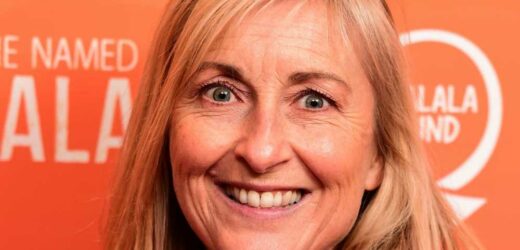TV host Fiona Philips has revealed she's been diagnosed with Alzheimer's disease at 62.
The former GMTV presenter said she was convinced her brain fog and anxiety was due to the menopause.
But she later discovered her symptoms were down to the most common cause of dementia in the UK.
Alzheimer's can be difficult to spot at first as it is often mistaken for other factors like depression, stress or "the change".
But there are some tell-tale early signs to look out for, according to the charity Alzheimer's UK.
Here are the five most common.
READ MORE ON ALZHEIMER’S
How Fiona Phillips, 62, hid devastating Alzheimer’s diagnosis from sons
Alzheimer’s drug hailed a ‘game-changer’ is one step closer to being used in UK
1. Memory problems
The first noticeable symptom is often memory problems, the organisation says.
Someone may have difficulty recalling recent events or learning information, for example.
These kinds of issues can make a person more likely to:
- Forget about recent conversations or events
- Get lost in a familiar place or on a familiar journey
- Forget appointments or significant dates
- Become increasingly disorganised
Most read in Health
Student, 19, dies after going to A&E with a 'sinus infection'
Glass of popular alcoholic drink can help men from flopping in bed
I'm a nutritionist – the WORST time of day to snack if you want to lose weight
Not brushing your teeth before bed 'increases your risk of silent killer'
Experts say this is because one of the first parts of the brain to be damaged is the hippocampus, which plays an important role in memory.
2. Thinking and reasoning difficulties
Alzheimer's UK says the second most common early sign of the condition is problems with thinking and reasoning. This includes:
- Difficulty concentrating (e.g. regularly being unable to follow a conversation or needing silence and complete focus to understand what someone is saying)
- Problems planning or organising (e.g. struggling to do everyday tasks in the right order, like cook a meal)
- Getting confused about what time of day it is or where they are
3. Trouble with language
Communication difficulties are also fairly common in the early stages.
Someone may find it challenging to find the right words or be able to concentrate on what is being said.
If you notice a person using general words like "thing" or "stuff", or saying "him" or "her" rather than using a name, then it might be worth contacting your GP.
Long pauses between words or sentences and struggling with place names can also be signs of Alzheimer's.
4. Changes in mood
As with many progressive conditions (ones that get worse over time), changes in mood are frequently reported.
Many people become anxious, more easily annoyed, sad or frightened, causing them to lose interest in the friends, activities or hobbies they used to enjoy.
Alzheimer's UK says it is hard to know whether this social withdrawal is caused by the disease itself, or the frustrations of struggling with everyday tasks because of their symptoms.
5. A shift in how things are seen and heard
Finally, though slightly less common, people might notice that loved ones begin to struggle to judge distances and see the outline of objects.
This can make using stairs or parking a car much harder, for example.
"They may also find certain noises uncomfortable or upsetting, such as loud music or lots of people in a room talking at the same time," Alzheimer's UK says.
This disease has ravaged my family and now it has come for me
Philips was diagnosed at the age of 62 after suffering with brain fog, anxiety and confusion.
She got in touch with a menopause specialist as "all the symptoms were there", and started taking HRT.
But the problems remained and her memory loss worsened before she eventually discovered what was causing it.
The presenter and columnist said the disease had "ravaged" her family and she had long feared being given the diagnosis.
According to the Mirror, Phillips was diagnosed more than a year ago and is undergoing trials for a new drug that could slow the effects of the disease.
Phillips, who is an Alzheimer's Society ambassador, told the Mirror: "This disease has ravaged my family and now it has come for me.
"And all over the country there are people of all different ages whose lives are being affected by it – it's heartbreaking.
"I just hope I can help find a cure which might make things better for others in the future."
As well as her column in the national newspaper, Phillips anchored GMTV for more than a decade from 1997.
She also competed on the BBC's Strictly Come Dancing in 2005.
She is married to Martin Frizell, editor of ITV's flagship programme, and has two sons – Nat, 24, and Mackenzie, 21.
'SHUDDERING SHOCK'
Phillips told the Mirror that despite fearing she would one day be diagnosed with Alzheimer's, the news was still a "gut punching, shuddering shock".
The telly host said that she felt "more angry than anything else" due to the disease already having impacted her family life.
"My poor mum was crippled with it, then my dad, my grandparents, my uncle. It just keeps coming back for us," she said.
Though she has kept the news private for 18 months, Phillips said she had decided to share her story to help end the stigma around Alzheimer's.
"There is still an issue with this disease that the public thinks of old people, bending over a stick, talking to themselves," she said.
"But I'm still here, getting out and about, meeting friends for coffee, going for dinner with Martin and walking every day."
She is taking part in clinical trials at University College Hospital in London, which aim to revolutionise future treatment.
Kate Lee, chief executive at Alzheimer's Society, praised Phillips' decision to share her diagnosis, which raised "much-needed awareness of dementia".
"Our thoughts are with our ambassador Fiona Phillips and her family following the announcement that she's living with dementia," she said.
"Fiona has frequently spoken out about her parents' experiences of dementia, and her support of Alzheimer's Society has been hugely impactful and greatly appreciated.
"Sharing such personal news publicly raises much-needed awareness of dementia and we are extremely grateful to Fiona.
"We are here to offer our support to Fiona and her family and to everyone affected by dementia."
It is thought at least five in every 100 people with Alzheimer’s are under 65.
Read More On The Sun
Why your Spain holiday will cost more and be harder to book this summer
I wore white to someone else’s wedding – haters slammed me but I don’t care
This figure may be higher as it can be more difficult to get an accurate diagnosis at a younger age.
People seeking help can visit alzheimers.org.uk or contact the support line on 0333 150 3456.
Symptoms in the later stage of Alzheimer’s
BECAUSE it is a progressive disease, the symptoms of Alzheimer's will get worse over time.
Problems with memory loss, language, reasoning and perception will make everyday living more difficult.
But the person may also start to behave in ways that seem unusual or out of character. For example, they may:
- Become agitated or restless
- Pace around
- Call out or
- Repeat the same question over and over again
- React aggressively
- Experience delusions, or less often hallucinations
In the later stages of Alzheimer’s, the person may:
- Have increasing problems with daily living, such as eating and drinking which may lead to weight loss
- Have problems with continence
- Become severely agitated or confused towards the late afternoon or early evening, sometimes known as sundowning
- Experience changes in sleep patterns, such as sleeping more and more during the day
Source: Alzheimer's UK
Source: Read Full Article











